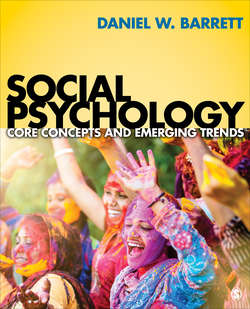Читать книгу Social Psychology - Daniel W. Barrett - Страница 27
На сайте Литреса книга снята с продажи.
Free Will
ОглавлениеIf you raise your hand to ask a question in class or choose to eat chocolate cheesecake rather than artichoke salad, are you making your decisions consciously? That is, do you do them out of your own free will? When I ask my students this, the overwhelming majority believe that yes, we have free will, and of course humans can consciously control what we do or think (Sharif et al., 2014). But psychologists are not so sure (Baer, Kaufman, & Baumeister, 2008; Hassin, Uleman, & Bargh, 2005). There is ample evidence that nonconscious processes—those we are not aware of—significantly affect what we think, feel, and do (Andersen, Moskowitz, Blair, & Nosek, 2007; Bar-Anan, Wilson, & Hassin, 2010; Evans & Frankish, 2009). For example, would you believe that exposure to words that relate to being elderly can make you act as if you were much older? In a fascinating study of nonconscious influences on behavior, participants were asked to unscramble sentences containing words suggestive of being older—like lonely, grey, wrinkled, forgetful—and this activity caused them to walk more slowly in comparison to a control group (Bargh, Chen, & Burrows, 1996). Since this behavior change occurred below the level of awareness, it could be argued that it undermined the free will of the participants. What do you think? More broadly, in what ways do think you exercise your free will? (To gauge your own beliefs about free will, see Self-Reflection Box 1.1.)
